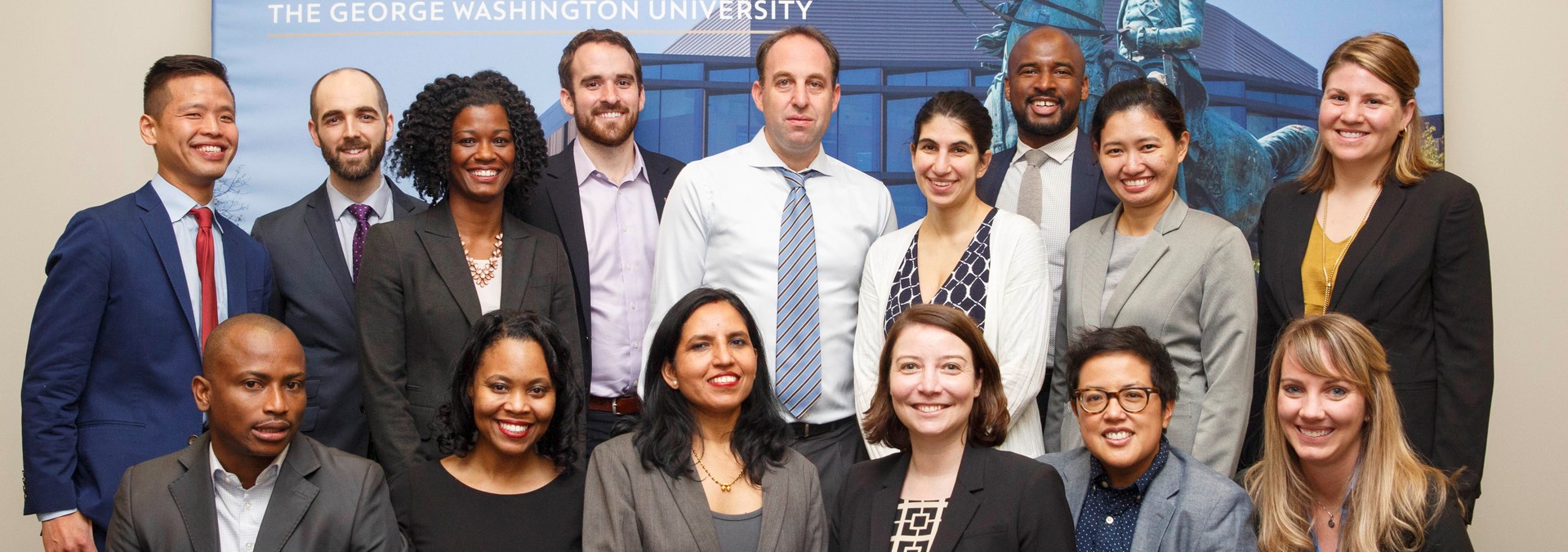The 16 professionals from around the world who were selected as 2018 Leaders in Health Equity recently began their fellowships with a trip to Washington, DC. During the two weeks they spent in the U.S. capital they began enhancing their abilities to advance health workforce equity.
“These fellows all arrived with impressive commitments to health equity. I am confident that they will go on to become leaders in a new generation of equity activists working to defeat health disparities all over the world,” said Fitzhugh Mullan, MD, Professor of Health Policy and Management at George Washington University’s (GW’s) Milken Institute School of Public Health and the Co-Director of the both the Leaders in Health Equity program and the university’s Health Workforce Institute.
At a welcoming reception, the fellows met GW’s president, Thomas LeBlanc, Milken Institute School of Public Health Dean Lynn R. Goldman, and Christopher Oechsli, president and chief executive officer of Atlantic Philanthropies, which funds the program.
The fellows’ first weeks of training included leadership seminars, as well as presentations by and interactions with noted leaders in health equity and health policy. Events at the university included talks about equity in the global health workforce by Dr. Mullan. Health Policy and Management Chair Thomas LaVeist, PhD, shared insights into understanding racial and ethnic disparities. Visiting Professor Tom Van Ourti, PhD, an Endowed Professor of Applied Health Economics, Erasmus School of Economics and Tinbergen Institute in the Netherlands, spoke about measuring socioeconomic inequities. Kofi Aboagye-Nyame, Pharm D, director of the USAID-funded Systems for Improved Access to Pharmaceuticals and Services program, discussed global pharmaceutical health disparities.
“Our fellows’ training is designed to help them tackle health disparities both in the U.S. and elsewhere in the world," said Guenevere Burke, MD, MBA, who is an Assistant Professor of Emergency Medicine at GW and Co-Director of the Leaders in Health Equity program. "Our approach is unique in that it sees disparities as ubiquitous and not limited to any single country or region.”
During their time in Washington, the fellows also visited some of the sights in and around the capital. They toured the National Museum of African American History and Culture and the U.S. Capitol, and they visited the Senate. The fellows also traveled to Baltimore, Md., where they met up with Leana Wen, MD, the Commissioner of Health for the City of Baltimore, and others at the Baltimore City Health Department. They also visited the offices of the Baltimore Corps, a nonprofit organization with the goal of advancing equity and racial justice in the city.
The photo above shows all of this year’s fellows (who are identified along with their home organizations):
Front row (left to right): Stephen Sevalie (Republic of Sierra Leone Armed Forces, Sierra Leone), Christina Rosenthal (Paradigm Dental Center, Memphis, TN), Anjali Singh Kulkarni (Public Health Foundation of India, India), Emily MacDonald (Erie Family Health Center, Chicago, IL), Angela Echiverri (Contra Costa Health Services, San Francisco, CA), and Amanda Brosnan (University Medicine Associates, San Antonio, TX).
Second row (left to right) James Huang (Unity Health Care, Washington, DC), Jordan Luke (Centers for Medicare & Medicaid Services, Office of Minority Health, Baltimore, MD), Kai Kennedy (Duke University, Durham, NC), Tyler Spencer (The Grassroot Project, Washington, DC), Jonatan Konfino (Centro de Estudios de Estado y Sociedad (CEDES), Argentina), Zeina Saliba (The GW Medical Faculty Associates, Washington, DC), Lesford Duncan (San Bernardino County Department of Behavioral Health, San Bernardino, CA), Debbie Liao (Local Government Unit-Gamay, Philippines), and Sarah Hooper (UCSF/UC Hastings Consortium on Law, Science & Health Policy, San Francisco, CA).


